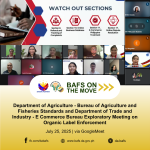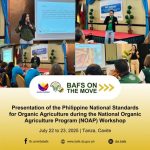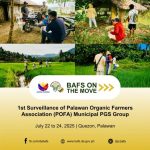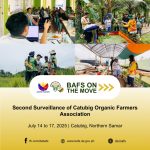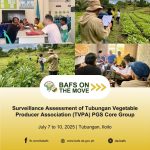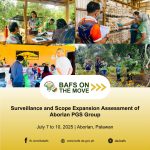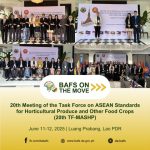Posted on by Allister Budlao
On November 23, 2024, the Department of Agriculture – Bureau of Agriculture and Fisheries Standards (DA-BAFS), together with OCCP Inspection and Certification Services, Inc., and a third-party certified operator (LiveGreen International, Inc.), participated in DWPM Radyo 630 TeleRadyo Serbisyo’s Wais Konsyumer Program hosted by Mr. Alvin Elchico. The session aimed to raise public awareness about organic food products, specifically focusing on the certification and benefits of these products in the Philippines and the mandate and functions of DA-BAFS and certifying bodies.
During the program, the representatives addressed a series of questions to clarify the concept and significance of organic food. It was emphasized that for a product to be considered truly organic—and thereby labeled with the Philippine Organic Mark and the seal of conformity of an accredited organic certifying body (OCB)—it must adhere to the Philippine National Standards (PNS) for Organic Agriculture and be certified by an accredited OCB.
One of the key topics discussed was the misconception regarding the cost of organic food in the Philippine market. While organic products are generally more expensive than conventional ones, it was explained that this is due to the meticulous production process and strict compliance with organic standards.
The safety and integrity of organic products were also highlighted. DA-BAFS assured the public that the agency ensures the safety and quality of organic products through monitoring and the accreditation of certifying bodies. It was further explained that organic certification is a mandatory process for producers and traders who wish to label their products as “organic.” Certification is granted by DA-BAFS-accredited OCBs, including organizations like OCCP-ICSI and Control Union Philippines, Inc. (for third-party certification), as well as accredited Participatory Guarantee Systems (PGS) groups.
The representatives provided an overview of the certification process, which includes the submission of documentary requirements, on-site inspections, and compliance with organic standards. Farmers (or operators) need to provide proof of their organic practices, such as management plans and production records, to ensure transparency and traceability.
The segment concluded with a message for the public to support locally produced, certified organic products, emphasizing their benefits for health and the environment.
The engagement served as an effective platform to educate the public, especially consumers, about organic agriculture and to encourage the transition to more sustainable food systems in the Philippines.




